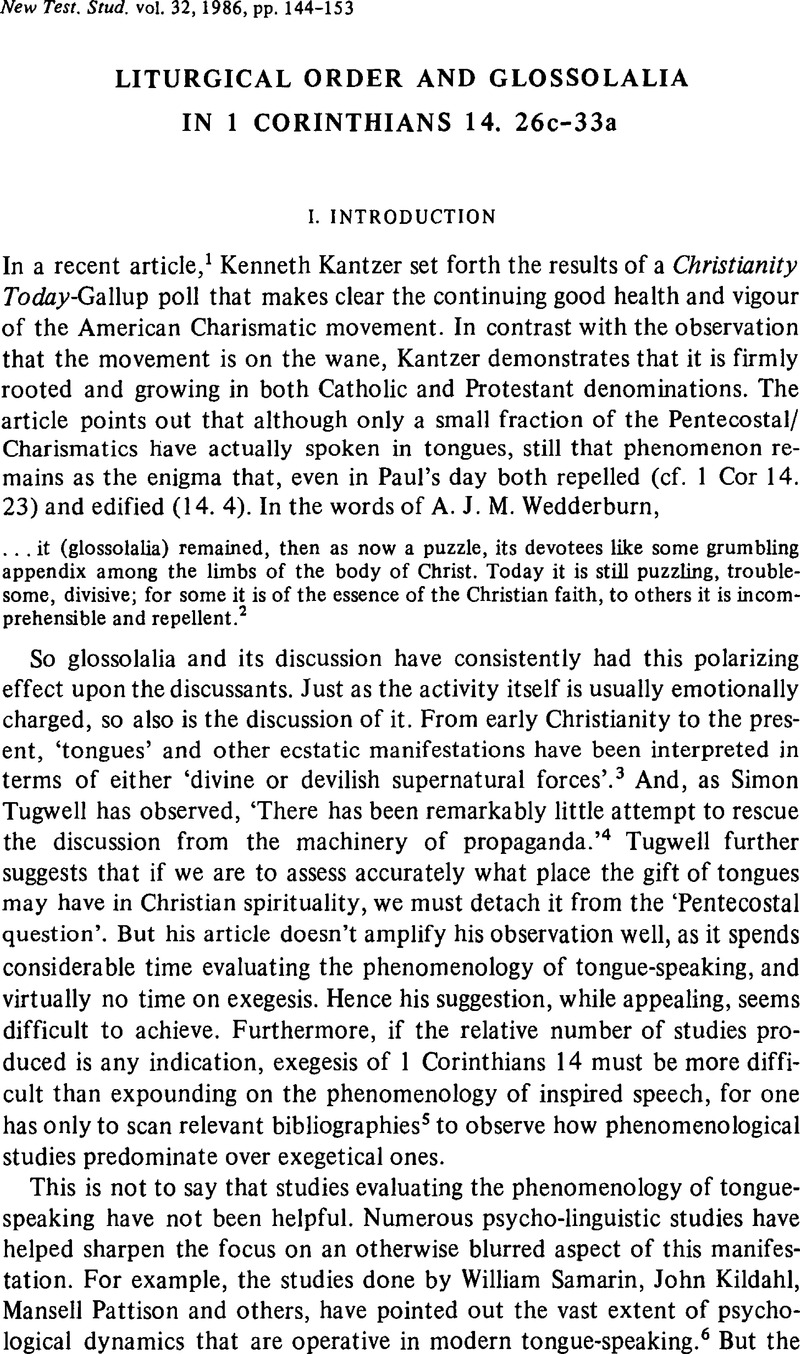Article contents
Liturgical order and Glossolalia in I Corinthians 14. 26c–33a
Published online by Cambridge University Press: 05 February 2009
Abstract

Information
- Type
- Short Studies
- Information
- Copyright
- Copyright © Cambridge University Press 1986
References
Notes
[1] Kantzer, Kenneth, ‘The Charismatics Among Us’, Christianity Today 24 (4, 1980) 245–9.Google Scholar
[2] Wedderburn, A. J. M., ‘Romans 8:26 - Towards A Theology of Glossolalie?’ Scottish Journal of Theology 28 (1975) 371.CrossRefGoogle Scholar
[3] Pattison, E. Mansell, ‘Behavioral Science Research on the Nature of Glossolalia’, Journal of the American Scientific Affiliation 28 (1975) 371.Google Scholar
[4] Tugwell, Simon, ‘The Gift of Tongues in the New Testament’, Expository Times 84 (1972–3) 137.CrossRefGoogle Scholar
[5] See especially, Ira Martin, J., Glossolalia, The Gift of Tongues – A Bibliography (Cleveland, Tenn.: Pathway Press, 1970)Google Scholar, and Mills, Watson, ‘Literature on Glossolalia’, Journal of the American Scientific Affiliation 26 (1974) 169–73.Google Scholar
[6] Samarin, William J., ‘Glossolalia as Learned Behavior’, Canadian Journal of Theology 15 (January, 1969) 60–4Google Scholar; Kildah, John P., The Psychology of Speaking in Tongues (New York: Harper & Row, 1972)Google Scholar; Pattison, E. Mansell, ‘Behavioral Science Research on the Nature of Glossolalia’, Journal of the American Scientific Affiliation 20 (1968) 73–86.Google Scholar
[7] Mills, Watson, ‘Literature on Glossolalia’, 169.Google Scholar
[8] Walker, Dawson, The Gift of Tongues (Edinburgh: T. & T. Clark, 1908) 72.Google Scholar Walker feels that the early church made no distinction between a Pentecostal type of tongue-speech and a Corinthian type. He feels both manifestations comprised an ecstatic outburst.
[9] Thiselton, A. C., ‘The Interpretation of Tongues, A New Suggestion in the Light of Greek Usage in Philo and Josephus’, Journal of Theological Studies 30 (1, 1979) 15–36.CrossRefGoogle Scholar
]10[ Hurd, J. C., The Origin of 1 Corinthians (New York: Seabury Press, 1965) 188, 189.Google Scholar
[11] Harpur, T. W., ‘The Gift of Tongues and Interpretation’, Canadian Journal of Theology 28 (1975) 371.Google Scholar
[12] Sweet, J. P. M., ‘A Sign for Un believers: Paul's Attitude to Glossolalia’, NTS 28 (1975) 371.Google Scholar
[13] Duquoc, Christian, Floristan, Casiano, eds. Charisms in the Church, ‘Charisms, Terminological Precision’, by Laurentin, Rene, trans., by Theo Weston (New York: The Seabury Press, 1978) 12.Google Scholar
[14] J. P.M. Sweet, Gerhard Delling, Hans Conzelmann, H. Pope, R. H. Fuller, to name just a few.
[15] Weiss, Johannes, Der Erste Korintherbrief (Göttingen: Vandenhoeck & Ruprecht, 1910) 334.Google Scholar
[16] Nicoll, W. Robertson, ed., The Expositor's Greek Testament, 6 vols. The First Epistle of Paul to the Corinthians, by G. G. Findlay (Grand Rapids, Mich.: Wm. B. Eerdmans Publishing Co, 1956) 2: 911.Google Scholar
[17] Robertson, A., & Plummer, A., A Critical and Exegetical Commentary on the First Epistle of St. Paul to the Corinthians (Edinburgh: T. & T. Clark, 1958) 319.Google Scholar
[18] Conzelmann, Hans, A Commentary on the First Epistle to the Corinthians, trans. Leitch, James W. (Philadelphia: Fortress Press, 1975) 244.Google Scholar
[19] Lenski, R. C. H., The Interpretation of St. Paul's First and Second Epistle to the Corinthians (Columbus, Ohio: Wortburg Press, 1955) 575.Google Scholar
[20] Arndt, William F. & Gingrich, F. Wilbur, A Greek-English Lexicon of the New Testament and Other Early Christian Literature (Chicago: University Press, 1963) 560.Google Scholar
[21] In ‘The Service of Worship’, Interpretation, 13 (1959), 404Google Scholar, Eduard Schweizer clearly over-states his case when he says, ‘Paul never speaks of edifying oneself; he always means edifying the congregation.’ Somehow he overlooked 14. 4, 17, where οικοδομεī clearly refers to the individual.
[22] Lührmann, Dieter, Das Offenbarungsverständnis bei Paulus und in paulinischen Gemeinden (WMANT, 16) Neukirchen (1965) 38.Google Scholar
[23] Bornkamm, Gunther, ‘Faith and Reason in Paul's Epistles’, NTS 4 (1957–1958) 98.Google Scholar
[24] Tugwell, Simon, ‘The Gift of Tongues’, 140.Google Scholar
[25] Sweet, J. P. M., ‘A Sign for Unbelievers’, 256.Google Scholar
[26’ On this side of the issue are Robert Gundry, J. G. Davies, Chas. Hodge, William MacDonald, Massingberd Ford, William Bellshaw and others.
[27] Hopwood, P. G. S., The Religious Experience of the Primitive Church (New York: Charles Scribner's Sons, 1937) 148.Google Scholar
[28] Michael, John H., ‘The Gift of Tongues at Corinth’, Expositor, 7th Series 4 (1907) 258.Google Scholar
[29] Delling, Gerhard, Worship in the New Testament, trans. Percy Scott (Philadelphia: Westminster, 1962) 32.Google Scholar
[30] Engelsgin, N. I. J., Glossolalia and Other Forms of Inspired Speech According to I Corinthians 12–14 (Ann Arbor, Michigan: University Microfilms, 1971)143.Google Scholar
[31] Harrisville, Roy, ‘Speaking in Tongues: A Lexicographical Study’, The Catholic Biblical Quarterly 38 (1, 1976) 45.Google Scholar
[32] ibid.
[33] Engelsen, , Glossolalia, 58.Google Scholar
[34] ibid., 60.
[35] Baker, David, ‘The Interpretation of 1 Corinthian 12–14’, Evangelical Quarterly 46 (4, 1974) 233.Google Scholar
[36] Cullmann, Oscar, Early Christian Worship (London: SCM Press LTD, 1953) 33.Google Scholar
[37] Rahner, Karl, The Dynamic Element in the Church (London: Burns & Oates, 1964) 52.Google Scholar
[38] Conzelmann, , A Commentary 244.Google Scholar
[39] Hahn, Ferdinand, The Worship of The Early Church, trans. Green, David E. (Philadelphia: Fortress Press, 1973) 72.Google Scholar
[40] Dunn, James, Unity and Diversity in the New Testament (Philadelphia: The Westminster Press, 1977) 174.Google Scholar
[41] Sweet, J. P. M., ‘A Sign for Unbelievers’, 248.Google Scholar
- 1
- Cited by

